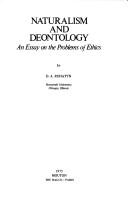
ISBN: 9027932336 Year: 1975 Publisher: The Hague Mouton
Abstract | Keywords | Export | Availability | Bookmark
 Loading...
Loading...Choose an application
- Reference Manager
- EndNote
- RefWorks (Direct export to RefWorks)
Professional ethics. Deontology --- Deontic logic --- Ethics, Evolutionary --- Ethics, Naturalistic --- Evolutionary ethics --- Naturalistic ethics --- Ethics --- Ethical relativism --- Logic, Deontic --- Duty --- Modality (Logic) --- Beroepsethiek. Deontologie
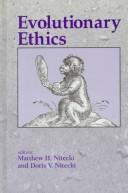
ISBN: 0791415007 9780791415009 Year: 1993 Volume: *1 Publisher: Albany State University of New York Press
Abstract | Keywords | Export | Availability | Bookmark
 Loading...
Loading...Choose an application
- Reference Manager
- EndNote
- RefWorks (Direct export to RefWorks)
General ethics --- Darwin, Charles --- Ethics, Evolutionary. --- Ethics [Evolutionary ] --- Ethics [Naturalistic ] --- Ethique évolutionniste --- Evolutionary ethics --- Evolutionisme in de ethiek --- Evolutionistische ethiek --- Evolutionnisme en éthique --- Naturalistic ethics
Book
ISBN: 0691024235 0691603863 140086030X Year: 2014 Publisher: Princeton, N.J. : Princeton University Press,
Abstract | Keywords | Export | Availability | Bookmark
 Loading...
Loading...Choose an application
- Reference Manager
- EndNote
- RefWorks (Direct export to RefWorks)
T. H. Huxley (1825-1895) was not only an active protagonist in the religious and scientific upheaval that followed the publication of Darwin's theory of evolution but also a harbinger of the sociobiological debates about the implications of evolution that are now going on. His seminal lecture Evolution and Ethics, reprinted here with its introductory Prolegomena, argues that the human psyche is at war with itself, that humans are alienated in a cosmos that has no special reference to their needs, and that moral societies are of necessity in conflict with the natural conditions of their existence. Seen in the light of current understanding of the mechanisms of evolution, these claims remain as controversial today as they were when Huxley proposed them. In this volume George Williams, one of the best-known evolutionary biologists of our time, asserts that recent biological ideas and data justify a more extreme condemnation of the "cosmic process" than Huxley advocated and more extreme denial that the forces that got us here are capable of maintaining a viable world. James Paradis, an expert in Victorian studies, has written an introduction that sets the celebrated lecture in the context of cultural history, revealing it to be an impressive synthesis of Victorian thinking, as well as a challenge to eighteenth-century assumptions about the harmony of of nature. With Huxley's lecture as a focal point, the three parts of this book unite philosophy and science in a shared quest that recalls their common origins as systems of knowledge.Originally published in 1989.The Princeton Legacy Library uses the latest print-on-demand technology to again make available previously out-of-print books from the distinguished backlist of Princeton University Press. These editions preserve the original texts of these important books while presenting them in durable paperback and hardcover editions. The goal of the Princeton Legacy Library is to vastly increase access to the rich scholarly heritage found in the thousands of books published by Princeton University Press since its founding in 1905.
Book
ISBN: 0262270021 0585480974 9780262270021 9780585480978 Year: 2003 Publisher: Cambridge, Mass. : MIT Press,
Abstract | Keywords | Export | Availability | Bookmark
 Loading...
Loading...Choose an application
- Reference Manager
- EndNote
- RefWorks (Direct export to RefWorks)
In Natural Ethical Facts William Casebeer argues that we can articulate a fully naturalized ethical theory using concepts from evolutionary biology and cognitive science, and that we can study moral cognition just as we study other forms of cognition. His goal is to show that we have "softly fixed" human natures, that these natures are evolved, and that our lives go well or badly depending on how we satisfy the functional demands of these natures. Natural Ethical Facts is a comprehensive examination of what a plausible moral science would look like. Casebeer begins by discussing the nature of ethics and the possible relationship between science and ethics. He then addresses David Hume's naturalistic fallacy and G. E. Moore's open-question argument, drawing on the work of John Dewey and W. V. O. Quine. He then proposes a functional account of ethics, offering corresponding biological and moral descriptions. Discussing in detail the neural correlates of moral cognition, he argues that neural networks can be used to model ethical function. He then discusses the impact his views of moral epistemology and ontology will have on traditional ethical theory and moral education, concluding that there is room for other moral theories as long as they take into consideration the functional aspect of ethics; the pragmatic neo-Aristotelian virtue theory he proposes thus serves as a moral "big tent." Finally, he addresses objections to ethical naturalism that may arise, and calls for a reconciliation of the sciences and the humanities. "Living well," Casebeer writes, "depends upon reweaving our ethical theories into the warp and woof of our scientific heritage, attending to the myriad consequences such a project will have for the way we live our lives and the manner in which we structure our collective moral institutions."
Ethics, Evolutionary --- Ethics --- Philosophy --- Philosophy & Religion --- Ethics, Naturalistic --- Evolutionary ethics --- Naturalistic ethics --- Ethical relativism --- Ethics, Evolutionary. --- PHILOSOPHY/General --- COGNITIVE SCIENCES/General
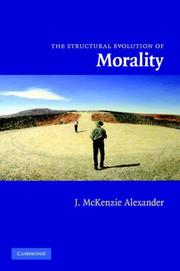
ISBN: 9780521870320 0521870321 9780511550997 9780521152693 9780511508073 0511508077 1107179904 0511550995 0511503997 0511508735 0511506139 0521152690 Year: 2007 Publisher: Cambridge, UK New York Cambridge University Press
Abstract | Keywords | Export | Availability | Bookmark
 Loading...
Loading...Choose an application
- Reference Manager
- EndNote
- RefWorks (Direct export to RefWorks)
It is certainly the case that morality governs the interactions that take place between individuals. But what if morality exists because of these interactions? This book, first published in 2007, argues for the claim that much of the behaviour we view as 'moral' exists because acting in that way benefits each of us to the greatest extent possible, given the socially structured nature of society. Drawing upon aspects of evolutionary game theory, the theory of bounded rationality, and computational models of social networks, it shows both how moral behaviour can emerge in socially structured environments, and how it can persist even when it is not typically viewed as 'rational' from a traditional economic perspective. This book also provides a theory of how moral principles and the moral sentiments play an indispensable role in effective choice, acting as 'fast and frugal heuristics' in social decision contexts.
Ethics, Evolutionary. --- Moral development. --- Ethics, Naturalistic --- Evolutionary ethics --- Naturalistic ethics --- Ethics --- Ethical relativism --- Ethical development --- Child psychology --- Moral education --- Faith development --- Arts and Humanities --- Philosophy
Book
ISBN: 9780521192422 9781139204385 1139204386 0521192420 9781139205962 113920596X 9780511894633 0511894635 9781139202978 9781107677777 1139199366 1107223156 1280484241 9786613579225 1139205161 1139202979 1139201565 1107677777 Year: 2011 Publisher: Cambridge Cambridge University Press
Abstract | Keywords | Export | Availability | Bookmark
 Loading...
Loading...Choose an application
- Reference Manager
- EndNote
- RefWorks (Direct export to RefWorks)
Ethical naturalism is narrowly construed as the doctrine that there are moral properties and facts, at least some of which are natural properties and facts. Perhaps owing to its having faced, early on, intuitively forceful objections by eliminativists and non-naturalists, ethical naturalism has only recently become a central player in the debates about the status of moral properties and facts which have occupied philosophers over the last century. It has now become a driving force in those debates, one with sufficient resources to challenge not only eliminativism, especially in its various non-cognitivist forms, but also the most sophisticated versions of non-naturalism. This volume brings together twelve new essays which make it clear that, in light of recent developments in analytic philosophy and the social sciences, there are novel grounds for reassessing the doctrines at stake in these debates.
Ethics, Evolutionary --- Naturalism --- Materialism --- Mechanism (Philosophy) --- Philosophy --- Positivism --- Science --- Ethics, Naturalistic --- Evolutionary ethics --- Naturalistic ethics --- Ethics --- Ethical relativism --- Ethics, Evolutionary. --- Naturalism. --- Arts and Humanities
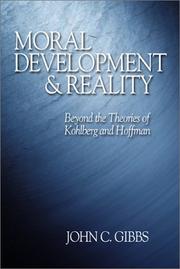
ISBN: 1452233608 1452264457 9781452264455 9781452233604 9780761923893 0761923896 Year: 2003 Publisher: Thousand Oaks, Calif. ; London : SAGE,
Abstract | Keywords | Export | Availability | Bookmark
 Loading...
Loading...Choose an application
- Reference Manager
- EndNote
- RefWorks (Direct export to RefWorks)
The author explores moral development through the theories of Kohlberg & Hoffman, contributing to the broad dialogue on the question & nature of moral development & behaviour, as well as providing an introduction to these theories.
Moral development. --- Ethics, Evolutionary. --- Ethics, Naturalistic --- Evolutionary ethics --- Naturalistic ethics --- Ethics --- Ethical relativism --- Ethical development --- Child psychology --- Moral education --- Faith development --- Moral development
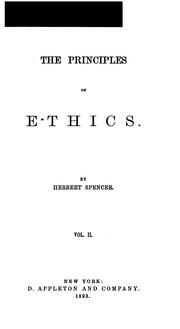
ISBN: 1461937086 1614878617 9781461937081 0913966347 9780913966341 0913966754 9780913966754 Year: 1978 Publisher: Indianapolis Liberty Classics
Abstract | Keywords | Export | Availability | Bookmark
 Loading...
Loading...Choose an application
- Reference Manager
- EndNote
- RefWorks (Direct export to RefWorks)
Though almost forgotten today, Herbert Spencer ranks as one of the foremost individualist philosophers. His influence in the latter half of the nineteenth century was immense. Spencer's name is usually linked with Darwin's, for it was he who penned the phrase, "survival of the fittest." Today in America he is most often admired for his trenchant essays in The Man Versus the State. But Spencer himself considered The Principles of Ethics to be his finest work. In the second volume, under "Justice," is his final statement on the role of the state. His formula for justice is summed up in these words: "Every man is free to do that which he wills, provided he infringes not the equal freedom of any other man."
Ethics, Evolutionary. --- Ethics. --- Ethics, Naturalistic --- Evolutionary ethics --- Naturalistic ethics --- Ethics --- Ethical relativism --- Deontology --- Ethics, Primitive --- Ethology --- Moral philosophy --- Morality --- Morals --- Philosophy, Moral --- Science, Moral --- Philosophy --- Values
Book
ISBN: 1139136674 110804042X Year: 2012 Publisher: Cambridge : Cambridge University Press,
Abstract | Keywords | Export | Availability | Bookmark
 Loading...
Loading...Choose an application
- Reference Manager
- EndNote
- RefWorks (Direct export to RefWorks)
Leslie Stephen (1832-1904) was an English biographer, and a writer on philosophy, ethics and literature. He was educated at Eton, King's College, London, and then Trinity College in Cambridge, where he remained as a fellow and a tutor for his entire career. He was also a keen mountaineer, taking part in first ascents of nine peaks in the Alps. He served as the first editor (1885-91) of the Dictionary of National Biography and in 1871 he became editor of the Cornhill Magazine. During his eleven-year tenure he wrote two successful books on ethics, of which this work, published in 1882, was one. It was widely adopted as a standard textbook on moral philosophy, and became one of the most influential publications on the ideas of evolutionary ethics that had been inspired by Darwin's theory of evolution by natural selection.
Ethics. --- Ethics, Evolutionary. --- Ethics, Naturalistic --- Evolutionary ethics --- Naturalistic ethics --- Ethics --- Ethical relativism --- Deontology --- Ethics, Primitive --- Ethology --- Moral philosophy --- Morality --- Morals --- Philosophy, Moral --- Science, Moral --- Philosophy --- Values
Book
ISBN: 1108540066 1108529186 110854276X 1108423698 110843827X Year: 2018 Publisher: Cambridge : Cambridge University Press,
Abstract | Keywords | Export | Availability | Bookmark
 Loading...
Loading...Choose an application
- Reference Manager
- EndNote
- RefWorks (Direct export to RefWorks)
In this crisply written book, Hanno Sauer offers the first book-length treatment of debunking arguments in ethics, developing an empirically informed and philosophically sophisticated account of genealogical arguments and their significance for the reliability of moral cognition. He breaks new ground by introducing a series of novel distinctions into the current debate, which allows him to develop a framework for assessing the prospects of debunking or vindicating our moral intuitions. He also challenges the justification of some of our moral judgments by showing that they are based on epistemically defective processes. His book is an original, cutting-edge contribution to the burgeoning field of empirically informed metaethics, and will interest philosophers, psychologists, and anyone interested in how - and whether - moral judgment works.
Ethics. --- Ethics, Evolutionary. --- Ethics, Naturalistic --- Evolutionary ethics --- Naturalistic ethics --- Ethics --- Ethical relativism --- Deontology --- Ethics, Primitive --- Ethology --- Moral philosophy --- Morality --- Morals --- Philosophy, Moral --- Science, Moral --- Philosophy --- Values

 Search
Search Feedback
Feedback About
About Help
Help News
News